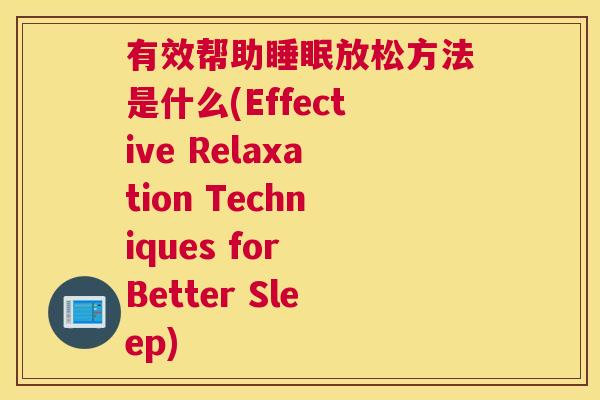有效帮助睡眠放松方法是什么(Effective Relaxation Techniques for Better Sleep)
Introduction
Quality sleep is essential for overall health and well-being. However, many people struggle to fall asleep or stay asleep due to stress, anxiety, or other factors. Effective relaxation techniques can help promote better sleep by calming the mind and body before bedtime.
Deep Breathing Exercises

Deep breathing exercises are a simple yet powerful relaxation technique that can help prepare the body for sleep. By focusing on slow, deep breaths, you can activate the body's relaxation response, which promotes feelings of calmness and reduces stress. To practice deep breathing, find a comfortable position, close your eyes, and take slow, deep breaths in through your nose and out through your mouth. Repeat this process for several minutes, allowing your body to relax with each breath.
Progressive Muscle Relaxation
Progressive muscle relaxation is a technique that involves tensing and then relaxing each muscle group in the body, one at a time. This practice helps release physical tension and can promote feelings of relaxation, making it easier to fall asleep. To try progressive muscle relaxation, start by tensing the muscles in your toes for a few seconds, then release and relax them completely. Move on to the next muscle group, working your way up through the body, until you reach the muscles in your face and scalp. By the end of the exercise, your entire body should feel more relaxed and ready for sleep.
Guided Imagery
Guided imagery involves visualizing peaceful and calming scenes or experiences to promote relaxation. This technique can help distract the mind from racing thoughts or worries, making it easier to drift off to sleep. To practice guided imagery, find a quiet and comfortable space to sit or lie down. Close your eyes and imagine yourself in a serene and tranquil environment, such as a peaceful beach or a tranquil forest. Focus on the details of the scene, such as the sound of the ocean waves or the rustling of leaves in the breeze. Allow yourself to fully immerse in the imagery, letting go of any tension or stress with each breath.
Mindfulness Meditation
Mindfulness meditation involves focusing on the present moment without judgment, which can help calm the mind and promote relaxation. This practice can be particularly helpful for quieting racing thoughts and reducing anxiety before bedtime. To practice mindfulness meditation, find a comfortable position and close your eyes. Focus your attention on your breath, noticing the sensation of each inhale and exhale. If your mind begins to wander, gently redirect your focus back to your breath without judgment. Continue this practice for several minutes, allowing yourself to fully immerse in the present moment and letting go of any distractions or concerns.
Aromatherapy
Aromatherapy involves using essential oils to promote relaxation and improve sleep quality. Certain scents, such as lavender, chamomile, and sandalwood, have been shown to have calming effects on the mind and body, making them ideal for bedtime use. To incorporate aromatherapy into your bedtime routine, consider using a diffuser to fill your bedroom with soothing scents or applying diluted essential oils to your skin before bedtime. You can also add a few drops of essential oil to a warm bath or use a pillow spray to promote relaxation and better sleep.
Conclusion
Effective relaxation techniques can play a crucial role in promoting better sleep and overall well-being. By incorporating practices such as deep breathing exercises, progressive muscle relaxation, guided imagery, mindfulness meditation, and aromatherapy into your bedtime routine, you can help calm the mind and body, making it easier to fall asleep and enjoy a restful night's sleep.






